#Sharpeville
Text
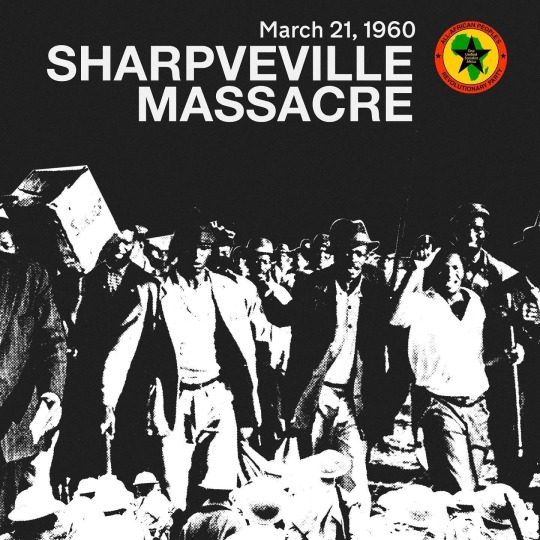
Today we remember the Sharpeville massacre when thousands marched to the police stations in South Africa called by our leaders of the movement to destroy our passbooks ( used in apartheid South Africa to classify anyone who wasn't white and restrict their movements) and to say no more of apartheid. The police responded with gun fire killing many, wounding even more and sparking the next stage of the struggle for liberation! We must remember the past to remember what we have done and what we must do for our freedom. We will not forget nor forgive!
Forward to a unified and socialist Africa!
#sharpevillemassacre #azania #southaftica #FreetheLand 🌍 #FreethePeople #panafricanism #HomelandorDeath #PanAfricanismorPerish #DefendAFRICA #Organize #JoinanOrganization #allafricanpeoplesrevolutionaryparty #BuildtheAAPRP #BuildTheAAWRU #AAPRP #AAWRU #JoinTheAfricanRevolution #Liberation
#USoutofEverywhere #FranceoutofEverywhere #EuropeoutofEverywhere #UsoutoftheUS
#abolishNATO #shutdownafricom #antiimperialism #anticolonialism #antineocolonialism
14 notes
·
View notes
Link
Given the history of March 21, some leaders are now calling for the day's name to be changed to better reflect its origins.
FECCA, the national peak body representing people from culturally and linguistically diverse backgrounds, is among them. They would like to see the name changed back to [the Elimination of Racial Discrimination Day,] the one given by the United Nations in the years following the Sharpeville massacre.
#multiculturalism#dark history#racial discrimination#massacre#Sharpeville#shooting#protesters#unarmed#South Africa#Harmony Day#Australia#news#via Triple A#world news
2 notes
·
View notes
Text
Tag gegen Rassismus
21. März 2024: Tag gegen #Rassismus
Heute ist der Internationale Tag gegen Rassismus. Bundesweit sind mehr als 4000 Veranstaltungen gemeldet worden. In der Region an Ems und Vechte leider keine. Dabei darf man nicht annehmen, dass Rassismus bei uns nicht verbreitet ist, auch wenn in Lingen noch Ende Januar 10.000 gegen Rassismus und die AfD demonstrierten.
Ganz anders ist es übrigens in Osnabrück wo 35 Vereine und Verbände in…
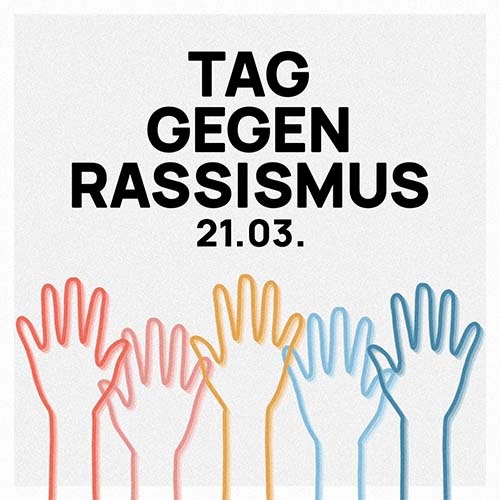
View On WordPress
#amnesty international#Dresden#Ems#Ems und Vechte#Lingen (Ems)#Rassismus#Sharpeville#Tag gegen Rassismus
0 notes
Photo

“Support the Mass Struggle Against Apartheid in South Africa.”
Abdul Hay Mosallam
International Artists Group
1980
#south africa#struggle#apartheid#anti-apartheid#Sharpeville Massacre#johannesburg#vintage#poster#africa
236 notes
·
View notes
Text
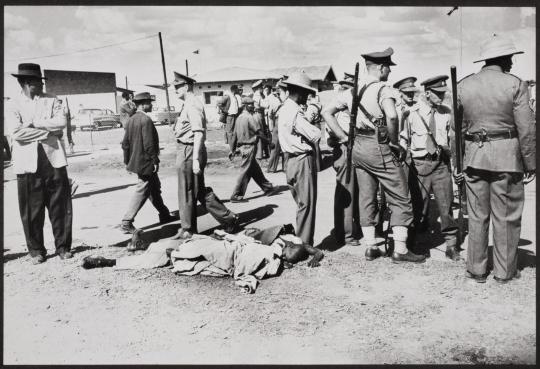
Peter Magubane, Sharpeville Shooting, March 21, 1960
In memoriam : Dr. Peter Magubane (1932-2024)
#peter magubane#b&w#black and white#photography#photojournalist#south africa#sharpeville shooting#1960#apartheid
2 notes
·
View notes
Text
youtube
#Max Roach#Abbey Lincoln#Coleridge Perkinson#Eddie Kahn#Clifford Jordan#Johannesburg#Sharpeville massacre of 1960#Apartheid
2 notes
·
View notes
Text
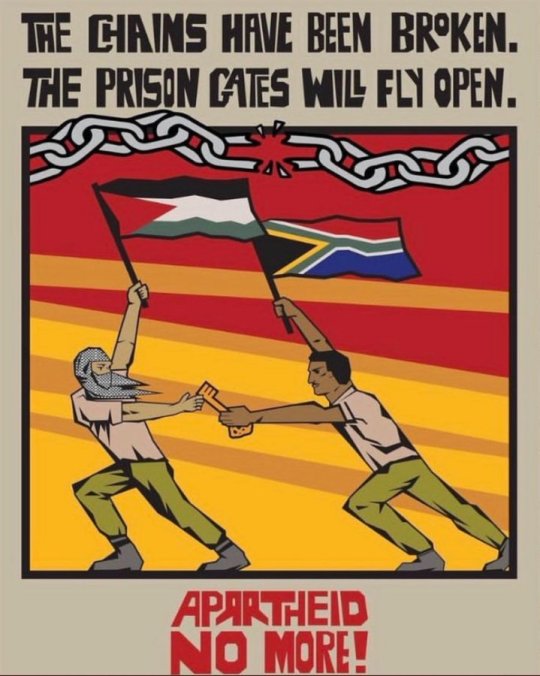
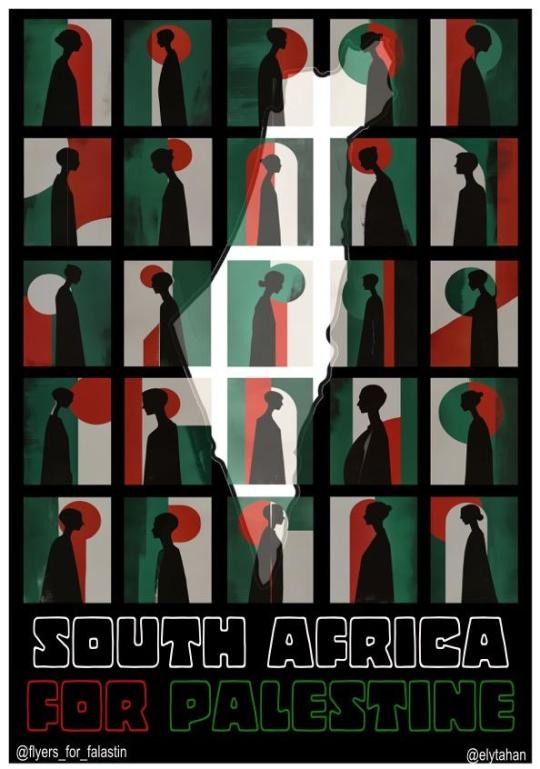
Today, 21st March is the UN International day for the elimination of racial discrimination. The date is observed to commemorate the victims of the Sharpeville massacre of 1960 in Apartheid South Africa. In 1966 the UN proclaimed it an official date, calling on the international community to redouble its efforts to eliminate all forms of racial discrimination. What happened in places like Sharpeville, Soweto and the bulldozing of Sophiatown are the reason we South Africans are so opposed to the Apartheid rule that Palestine is being subjected to. Last year the South African government took Israel to the international court of justice,because they know, Apartheid is Apartheid no matter where it occurs or how you try to explain it away.
This international day for the elimination of racial discrimination, when you reflect on what happened in South Africa, remember to please keep Palestine in your thoughts as well, please reblog and share any post that is asking for aid/ donations when it crosses the dash and please don't allow any misinformation about Palestine to be spread around! People who tell you this a nuanced issue, or that there are two sides are those who spread misinformation. Genocide and Apartheid are not a two sided issue !!
( images credits x x )
posts you can and should share:
meal donations
esims for gaza
list of orgs to donate to
donation links and calls for ceasefire.
more donation links.
general links
how you can help.
links for people in the U.K
gofundme links
28 notes
·
View notes
Text


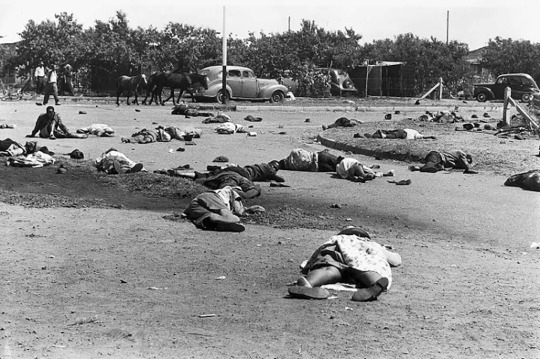

The Sharpeville Massacre occurred on 21st March, 1960, in the township of Sharpeville, South Africa. It resulted in the largest number of South African deaths (up to that point) in a protest against apartheid.
Sharpeville, a black suburb outside of Vereeniging (about 50 miles south of Johannesburg), was untouched by anti-apartheid demonstrations that occurred in surrounding towns throughout the 1950s. By 1960, however, anti-apartheid activism reached the town.
In March 1960, Robert Sobukwe, a leader in the anti-apartheid Pan-Africanist Congress organized the town's first anti-apartheid protest. In order to reduce the possibility of violence, he wrote a letter to the police commissioner to emphasize that it would be non-violent.
On March 21, an estimated 7,000 South Africans gathered in front of the Sharpeville police station to protest against the restrictive pass laws. Nearly 300 police officers arrived to put an end to the peaceful protest.
As they attempted to disperse the crowd, a police officer was knocked down and many in the crowd began to move forward to see what had happened. Police witnesses claimed that stones were thrown, and in a panicked reaction, they opened fire.
As the protesters tried to flee the violent scene, police continued to shoot into the crowd.
The police version, only 69 Africans were killed and 186 were wounded, with most shot in the back.
The Sharpeville Massacre awakened the international community to the horrors of apartheid. The massacre also sparked hundreds of mass protests by black South Africans.
On March 30, the South African government declared a state of emergency which made any protest illegal. The ban remained in effect until August 31, 1960. During those five months roughly 25,000 people were arrested throughout the nation.
The government's repressive measures intensified and expended the opposition to apartheid, ushering in three decades of resistance & protest
With the election of Nelson Mandela as president of South Africa in 1994, the apartheid system ended. In 1994, Mandela signed the nation's first post-apartheid constitution near the site of the 1960 massacre.
•••
La Masacre de Sharpeville sucedió el 21 de marzo de 1960, en el municipio de Sharpeville, Sudáfrica. Resultó en la mayor cantidad de muertes de sudafricanos (hasta ese punto) en un protesta en contra de la segregación racial.
Sharpeville, un suburbio habitado por personas negras en las afueras de Vereeniging (cincuenta millas al sur de Johannesburg), había permanecido intacto de las demostraciones anti-segregadoras que estaban ocurriendo en ciudades cercanas a lo largo de los 1950. En 1960, el activismo anti segregacionista llegó a la ciudad.
En marzo de 1960, Robert Sobukwe, un lider del Congreso Panafricano Anti-Segregacionista organizó la primera protesta anti segregacional. Para poder reducir la posibilidad de violencia, le escribió una carta al comisionado de la policía para enfatizar que seria una protesta pacífica.
El 21 de marzo, alrededor de 7,000 sudafricanos se reunieron en frente de la estación policial de Sharpeville para protestar en contra de las leyes restrictivas de paso (desplazamiento). Alrededor de 300 policías llegaron para poner fin a la protesta.
Mientras intentaban dispersar a la multitud, un oficial de policía fue derribado y muchos en la multitud comenzaron a acercarse para ver qué había sucedido. Testigos policiales afirmaron que se arrojaron piedras y, en una reacción de pánico, abrieron fuego. Mientras los protestantes estaban tratando de huir de la escena violenta, la policía siguió disparando contra la multitud.
Según la versión policial, 69 africanos fueron asesinados y 186 resultaron heridos, la mayoría disparados en la espalda.
La Masacre de Sharpeville despertó a la comunidad internacional a los horrores de la segregación racial. La masacre también provocó cientos de protestas masivas de sudafricanos negros.
El 30 de marzo, el gobierno sudafricano declaró un estado de emergencia, lo cual hizo que cualquier protesta fuese ilegal. La prohibición duró hasta el 31 de agosto de 1960. Durante esos cinco meses alrededor de 25,000 personas fueron arrestadas a lo largo de la nación.
Las medidas represivas del gobierno intensificaron y expandieron la oposición a la segregación racial, dando paso a tres décadas de resistencia y protesta.
Con la elección de Nelson Mandela como presidente de Sudáfrica en 1994, el sistema segregacional terminó. En 1994, Mándela firmó la primera constitución post segregación racial, cerca del lugar donde sucedió la masacre del año 1960.
#blacklivesmatter#blacklivesalwaysmatter#english#spanish#blackhistory#history#share#read#blackpeoplematter#blackhistorymonth#black history matters#black history#black history is world history#africanhistory365#africanhistory#black history 2023#historyfacts#black history is everybody's history#black history 365#blackhistoryfacts#blackhistoryeveryday#blackhistoryyear#black history month#knowyourhistory#like#follow#blackbloggers#blackownedandoperated#south africa#nelson mandela
93 notes
·
View notes
Text
re the shit happening in palestine
nobody knows what will happen i guess, but like. what's most likely? my doomscrolling brain can produce possibilities from 'genocide to rival the worst of the 20th century' through 'syria-style proxy war' all the way up to 'first act of wwiii', and I keep waiting for the other shoe to drop of the start of the ground invasion that would presumably make the sickening carnage of the last couple weeks look like nothing. meanwhile the countries around Israel are flinging a handful of rockets at US and Israeli military bases.
so like Israel's got to know that if it sends its whole army into Gaza, then Hezbollah etc. will attack and things will get much worse for them, so at some point they have to back down right? they're already having to play desperate PR damage control after they blew up that hospital, and even the U.S. is starting to say out of the corner of its mouth 'hey that's a bit much there buddy, go easy on the civilian slaughter'. on the other hand Israel seems to be pushing even fashier to enforce a pro-war sentiment internally - locking up any Arab citizen who says something anti-war, banning news orgs like Al Jazeera who don't toe the line, etc. like is it just going to fall back to the status quo plus several thousand bodies, or are we too far from that equilibrium at this point?
and as for Hamas and its allies - obviously they would have known that if they carried out a massive, bloody attack on Israel, the Israelis would go completely berserk and launch an even larger reprisal on the population of Gaza. ergo, they had to have believed that whatever they would achieve through such an attack might be 'worth that price', and have some sense of how things might go next - and they're still fighting, shooting rockets etc., but what's their current objective, just to survive as an organisation until other countries get pulled in against Israel?
really what i want to have some reason to believe is that there might be any remotely plausible way this can still work out to a 'better' state of affairs (no ethnic cleansing, no megadeaths - but also no more ghettoes, and somehow, end-of-apartheid-style negotiations to abolish the current Israeli state so that Palestinians can return home with equal legal rights etc.).
i see people talking like here is how the Palestinians will still win, that this is the first act in the overthrowing of Israel, even defining various neighbouring Islamic states as 'the resistance', because you need a team to cheer for I guess, enemy-of-my-enemy logic. but what seems more likely to come from that kind of escalation would just be a massive war which, if recent wars are anything to go by, will kill a lot of people and push every state/group involved to greater levels of internal repression, but eventually peter out without any sort of clear outcome. so... is Israel somehow much more fragile than it used to be? is there reason to think the US would cut it off?
anyway. for some historical comparisons - the Haitian Revolution took a little over 12 years (1791-1804) between the initial slave revolt and establishing an independent country (which promptly got squashed with debt and trade sanctions by the bitter European powers). in South Africa, the ANC turned to insurgency in the wake of the Sharpeville Massacre of 1960, and about 31 years later negotiations began for the end of apartheid (during the collapse of the USSR, which shifted the priorities of the US etc. who had been backing the apartheid gov). the Algerian War of Independence lasted about seven years (1954-1962). if this anti-colonial war is going to follow a similar trajectory... well, it depends when you start counting I guess, but probably it would take a decade or more to approach any sort of 'resolution' you could name.
the status quo obviously couldn't last indefinitely, you can't just keep a population in a massive prison and gradually bleed them out and not expect them to fight back, but in terms of ways this could fall down, there are some obviously very bad outcomes (nakba 2, surviving palestinians in Gaza exiled to e.g. egypt) that could establish a new equilibrium (apartheid state annexes the whole region after sufficiently depopulating it to establish a majority). that's not implausible, it's basically what happened in the U.S.A., Canada and Australia - the settler population now outnumbers the indigenous ones by orders of magnitude, and maintains a complicated legal regime to control the surviving population (reservations etc.). that's presumbly the outcome the present state of Israel 'wants' to achieve, gradually enough that it doesn't look too bad on TV. however, it's not there yet - in the combined territory of Israel and Palestine, there's presently roughly equal numbers of people defined by the census to be Jewish vs Palestinian.
conversely... the state of Israel's constantly broadcast fears about a combined 'one state solution' resulting in the Jewish population being treated the way the Israeli state currently treats the Palestinians (ethnic cleansing, massacres etc.), and the great-replacement birthrate bullshit, are surely completely overblown (notably the much smaller white population in South Africa was not banished at the end of apartheid), but what happens rather depends exactly how the state of Israel might collapse and who would hold power afterwards. and... in South Africa, the apartheid government in the last few apartheid years started to realise it had lost the game, and was making some paltry concessions - which the Israeli gov. is not doing at all, seeming to prefer to rush headlong into an 'us or them' war of annihilation, confident the U.S. will let it do whatever reckless shit it wants?
all in all it's a horrifying mess and I find it hard to feel any sort of hope that it won't just get worse in one of a dozen different ways. would love to be convinced otherwise. i always assume things will go in the bleakest way possible, which is not a very reliable mindset.
23 notes
·
View notes
Text
Human Rights Day
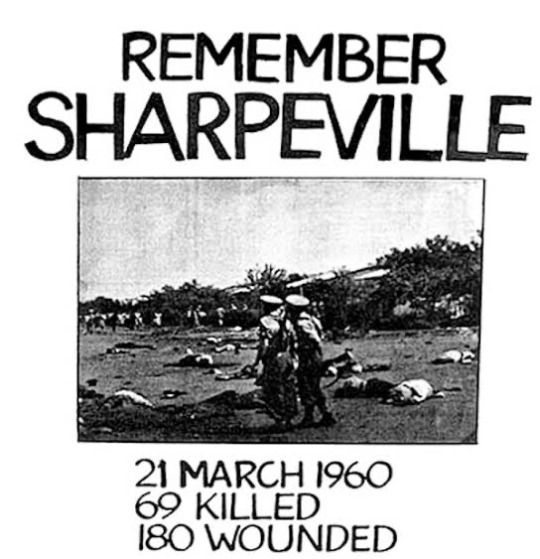
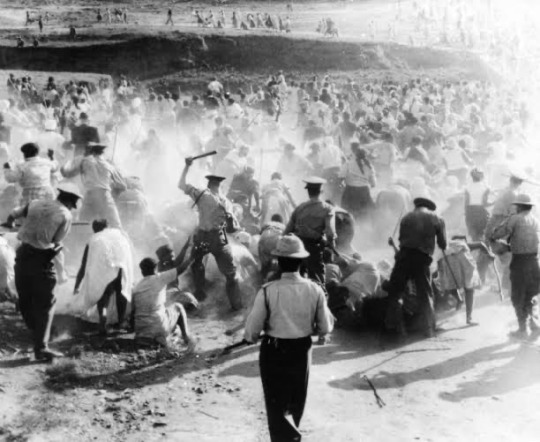
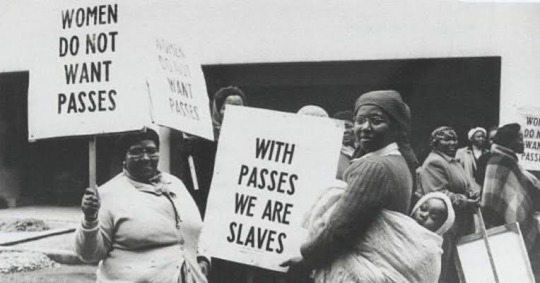
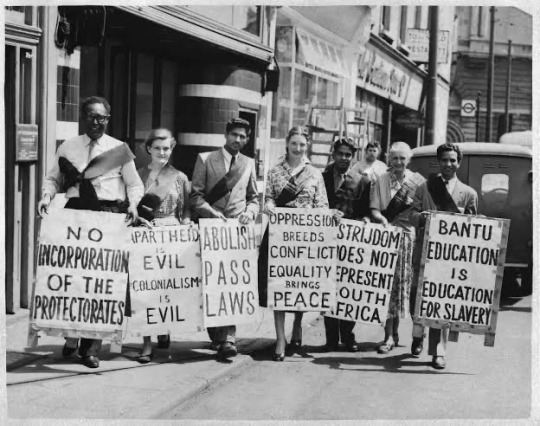
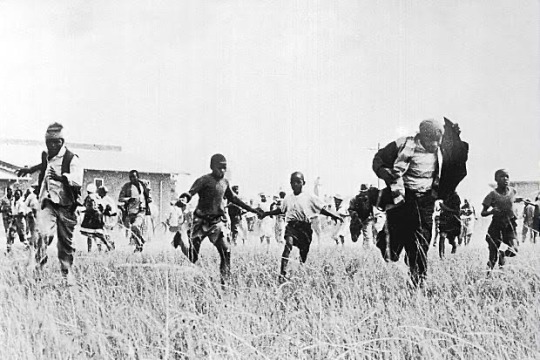
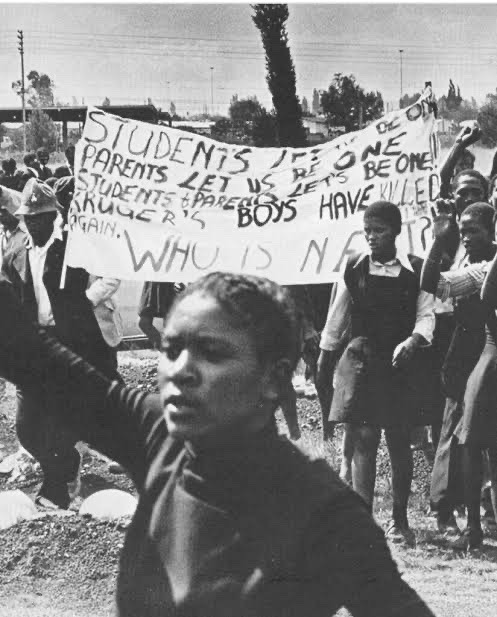
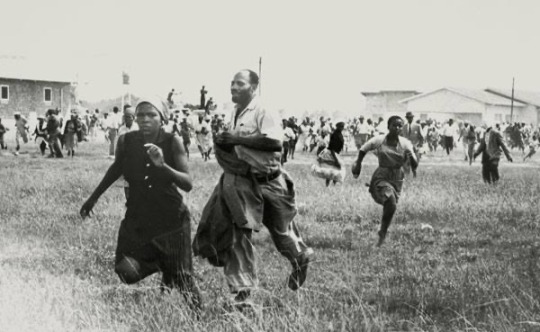
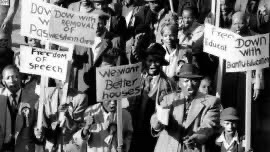

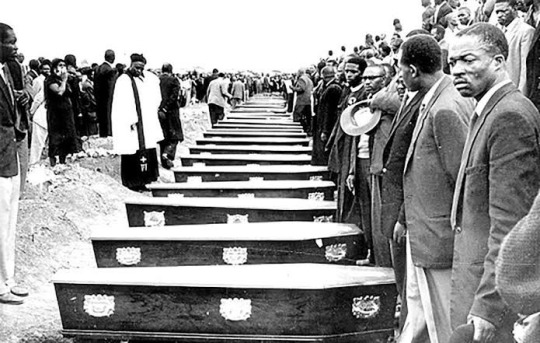
Human Rights Day is observed on 21 March in South Africa. This day commemorates the Sharpeville Massacre which occurred in 1960, where South African Police shot & murdered black protestors.
#South Africa#Africa#African#apartheid#human rights day#black#black history#radical feminism#radfem#radblr#radical feminists do interact#race#racism
27 notes
·
View notes
Text
"... The Palestinian West Bank is under international law an occupied territory. But the legal framework for occupations was devised for finite wars, not for situations that perdure for decades. The West Bank is actually an Israeli colony. Israel controls the land, water and airspace. It is gradually usurping the land and settling its own citizens on it, as Afrikaners did in South Africa. It is keeping the Palestinian population stateless and without basic human rights.
Population transfer is common under colonial conditions. The people of the Jenin refugee camp were expelled from their homes in what is now Israel in 1948, and the Israelis expropriated their farms, homes and other property, leaving them penniless. They were forbidden ever to return home and were offered, to say the least, no reparations for their losses. ..."
10 notes
·
View notes
Text
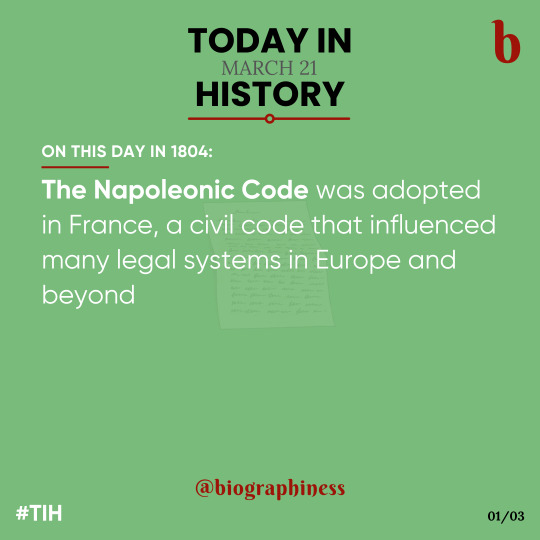
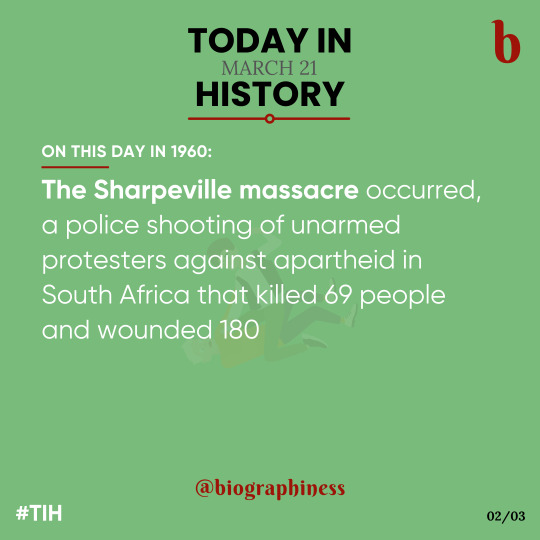
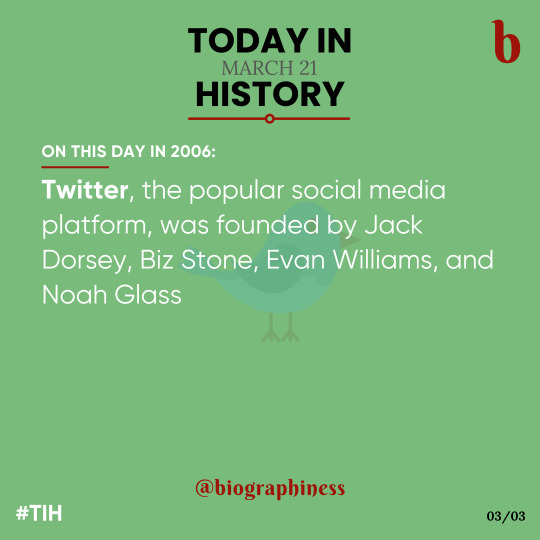
From Napoleonic Code to Twitter’s birth, history echoes through time. Remembering the Sharpeville Massacre’s impact.📜🐦
Follow👉 @biographiness
#Biographiness#Biograghines#TodayInHistory#TIH#onthisday#OTD#HistoryEvents#DailyHistory#HistoryFacts#March21#HistoryMatters#History#LegacyOfChange#HistoricMoments#GlobalShifts#NapoleonicCode#HistoricLaws#FrenchInfluence#SharpevilleMassacre#Apartheid#TwitterAnniversary#SocialMediaDay
4 notes
·
View notes
Text
ingoapele madingoane
Africa my Beginning
They came from the west
Sailing to the east
With hatred and disease flowing
From their flesh
And a burden to harden our lives
They claimed to be friends
When they found us friendly
And when foreigner met foreigner
They fought for the reign
Exploiters of Africa
Africa my beginning
And Africa my ending
They asked Mugabe
Unataka nini hapa
Wewe mwenyewe
He said binadamu zote
Ni ndugu zake za Africa
Nimefika nirudishie
Nchi zazimbabwe
Mimi ni mwenyewe
In Africa my beginning
And Africa my ending
Suckers of my country
They laid their sponges
Flat on its soil and absorbed its resources
To fill their coffers
Agostinho had spoken in the language of poets
That they went away in multitudes
And forgot their hearts behind
But late is never a bad start in
Africa my beginning
And Africa my ending
No easy way to freedom
Ten lonely years black hopeful men
Food being their wish
Courage their pay
Until Africa was respected
For a leader had emerged
From the bush to Maputo
Viva Frelimo
Africa my beginning
And Africa my ending
I remember Ja toivo
Namibia is not lost
Nujoma is not idle he'd be coward if he was
You might as well know Germany
In no more in
Africa my beginning
And Africa my ending
Azania here I come from apartheid in tatters
in the land of sorrow from that marathon bondage
the Sharpeville Massacre the flames of Soweto
I was there I will die there
In Africa my beginning
And Africa my ending
Let's do something
Mbopha
6 notes
·
View notes
Text
class notes
Apartheid
https://www.sahistory.org.za/article/grade-11-what-were-consequences-when-pseudo-scientific-ideas-race-became-integral
Climate theory (of racism) - the colder the weather, the smarter the human (read: stamped from the beginning). The theory suggests that black people in Africa had no way of being intelligent
Simian traits - “ape like”, connected to black portrayal and Irish portrayal: JFK significance: he was Irish and catholic
White people made themselves feel racially secure by making themselves the ideal face shape and differentiating themselves from other races “you are not white!”
“Wide sargasso sea” jean rhys
Darwin, the father of modern evolution theory, was himself religious and was antagonised by the church for disproving the creationist theory. He was also not pleased with how his theories were being used to persecute other races and nationalities
What were the four different categories of people introduced under the Race classification laws?
White
Indian
Coloured
Black
What was the pencil test and what purpose did it serve?
If a pencil was placed in a students hair and fell, they were white. If it stayed, they were not white enough
What was the Sharpeville massacre and what was it caused by?1952
A protest forcing law enforcement to arrest them in the hopes that they would collapse the jailing system ended in thousands being arresting
March 21st 1960
Police opened fire on unarmed protest killing 70 and wounding 180
Passbook - document that black people had to carry at all times to be able to travel
The protest was to abolish passbooks
What is (somewhat) ironic about Nelson Mandela having been awarded the Nobel Peace Prize?
He won the Nobel peace prize despite not being a pacifist
Imagine you educate someone online about systemic racism. Feel free to rant
Website is down
What factors increased the tensions between the blacks and the whites in the SA, and caused the later to want to control the former?
Black people were allowed to work in white spaces as many of the white population went to fight in ww2
Black people had to move into some white spaces such as living and work
ANC - African National Congress
4. He won the Nobel peace prize despite not being a pacifist
5.
6.
Dei steigers- “the sixties generation”
Brinks book was the first book to be banned by the south african government
How brink outwitted the censors
1979 printing: 3000 copies through a private publishing press in Johannesburg
Detected 2 weeks later - too late to confiscate the first printing, but the book was banned
Simultaneous publication in uk - a great success
Black June
Multi-day youth riots in Soweto started on the 26th June 1976
Brutally suppressed - armed personnel carriers, machine guns and helicopters against sticks and stones
SA internationally condemned for the massacre of the youth and the use of the violence at a mass scale
According to official statistics 175 killed (official citizens), 1140 wounded, 1300 arrested
A moral obligation
a dry white season illustrates the thesis made by brink in his article “after Soweto” 1976
following the massacre, the white citizens of SA shoulder a tremendous moral responsibility, which each should fulfill no matter the personal consequences.
Ben du Toit is an example of a person who took this moral obligation to the end.
Torture
Torturing political prisoners was frequent in SA in the 70s
The 1973 report of the UN Special Committee
Against Apartheid described over 100 cases of mistreatment of prisoners
Often used by Special Branch, specialised in detecting and fighting anti-government activity (methods near-identical with the Gestapo's)
According to the Western press, in 1977 alone at least 20 arrested people died in shady circumstances.
The author inspired some of the stories that happened to the protagonist from the experiences of others such as;
mohammed salim essop
Stephen bantu biko
Ahmed timol
Donald woods
James Thomas Kruger
To research: Steve Biko / Stephen Bantu Biko
Birth date: 18.12.1946
Death date: 12.09.1977
Founder of the “Black Consciousness” movement in South Africa
BCM was an anti-apartheid movement that was started in 1960. The movement started after the South African government outlawed the Pan-Africanist Congress and the African National Congress following the Sharpeville Massacre.
In his life, Biko was part of numerous anti apartheid movements. He began his efforts in protesting while at university (he first studied at st. Francis College and then at the University of Natal Medical School where he joined the multiracial National Union of South African Students).
His involvement lessened when he realised he found the NUSAS focused less on merging the rights of black and white people, but rather on viewing black people as the rightful majority. This was his reasoning for founding the SASO and becoming its president. The organisation was founded on the philosophy of black consciousness.
He drew censure in 1973 when SASO, its members and statements were restricted and banned. He reverted to operating covertly and, as a result was arrested and later died of died due to the torture he experienced while under arrest. He was found at the age of 31 outside a hospital naked, shackled and having experienced a brain haemorrhage.
Police denied responsibility for what happened to Biko, however, in 1997, five former officers admitted to being responsible for Biko’s death and applied for amnesty to the Truth and Reconciliation Commission (a way of getting consequences for their wrongdoings and committed atrocities).
216, 262
Notes:
Dark, uncertain
Charcoal metaphor
Highlight
2 notes
·
View notes
Text
History: Nelson Mandela, South Africa’s First Black President, Is Inaugurated
On May 9, 1994, South Africa’s newly elected parliament chose Nelson Mandela to be the country’s first Black president.
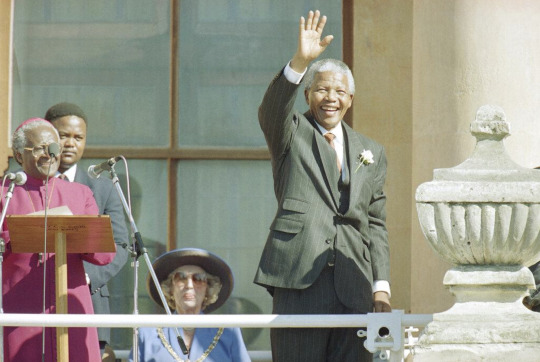
In South Africa, Nelson Rolihlahla Mandela is sworn in as the first Black president of South Africa. In his inaugural address, Mandela, who spent 27 years of his life as a political prisoner of the South African government, declared that “the time for the healing of the wounds has come.” Two weeks earlier, more than 22 million South Africans had turned out to cast ballots in the country’s first-ever multiracial parliamentary elections. An overwhelming majority chose Mandela and his African National Congress (ANC) party to lead the country.
Mandela, born in 1918, was the son of the chief of the Xhosa-speaking Tembu people. Instead of succeeding his father as chief, Mandela went to university and became a lawyer. In 1944, he joined the African National Congress (ANC), a Black political organization dedicated to winning rights for the Black majority in white-ruled South Africa. In 1948, the racist National Party came to power, and apartheid—South Africa’s institutionalized system of white supremacy and racial segregation—became official government policy. With the loss of Black rights under apartheid, black enrollment in the ANC rapidly grew. Mandela became one of the ANC’s leaders and in 1952 was made deputy national president of the ANC. He organized nonviolent strikes, boycotts, marches and other acts of civil disobedience.
After the massacre of peaceful Black demonstrators at Sharpeville in 1960, Nelson helped organize a paramilitary branch of the ANC to engage in acts of sabotage against the white minority government. He was tried for and acquitted of treason in 1961 but in 1962 was arrested again for illegally leaving the country. Convicted and sentenced to five years at Robben Island Prison, he was put on trial again in 1963 with seven others on charges of sabotage, treason, and conspiracy. In the celebrated Rivonia Trial, named after the suburb of Johannesburg where ANC weapons were found, Mandela eloquently defended his actions. On June 12, 1964, he was sentenced to life imprisonment.
Mandela spent the first 18 of his 27 years in jail at the brutal Robben Island Prison. He was confined to a small cell without a bed or plumbing and was forced to do hard labor in a quarry. He could write and receive a letter once every six months, and once a year he was allowed to meet with a visitor for 30 minutes. However, Mandela’s resolve remained unbroken, and while remaining the symbolic leader of the anti-apartheid movement, he led a movement of civil disobedience at the prison that coerced South African officials into drastically improving conditions on Robben Island. In 1982 he was moved to Pollsmoor Prison on the mainland, and in 1988 to a cottage, where he lived under house arrest.
In 1989, F.W. de Klerk became South African president and set about dismantling apartheid. De Klerk lifted the ban on the ANC, suspended executions, and on February 11, 1990, ordered the release of Nelson Mandela. Mandela subsequently led the ANC in its negotiations with the minority government for an end to apartheid and the establishment of a multiracial government. In 1993, Mandela and de Klerk were jointly awarded the Nobel Peace Prize. On April 26, 1994, the country’s first free elections were won by Mandela and the ANC, and a “national unity” coalition was formed with de Klerk’s National Party and the Zulus’ Inkatha Freedom Party. On May 10, Mandela was inaugurated in a ceremony attended by numerous international dignitaries.
As president, Mandela established the Truth and Reconciliation Commission to investigate human rights violations under apartheid and introduced numerous initiatives designed to improve the living standards of South Africa’s Black population. In 1996, he presided over the enactment of a new South African constitution. Mandela retired from politics in June 1999 at the age of 80. He was succeeded as president by Thabo Mbeki of the ANC, but remained a global advocate for peace and social justice until his death in December 2013.
2 notes
·
View notes
Text
Events 3.21
537 – Siege of Rome: King Vitiges attempts to assault the northern and eastern city walls, but is repulsed at the Praenestine Gate, known as the Vivarium, by the defenders under the Byzantine generals Bessas and Peranius.
630 – Emperor Heraclius returns the True Cross, one of the holiest Christian relics, to Jerusalem.
717 – Battle of Vincy between Charles Martel and Ragenfrid.
1152 – Annulment of the marriage of King Louis VII of France and Queen Eleanor of Aquitaine.
1180 – Emperor Antoku accedes to the throne of Japan.
1556 – On the day of his execution in Oxford, former archbishop of Canterbury Thomas Cranmer deviates from the scripted sermon by renouncing the recantations he has made and adds, "And as for the pope, I refuse him, as Christ's enemy, and Antichrist with all his false doctrine."
1788 – A fire in New Orleans leaves most of the town in ruins.
1800 – With the church leadership driven out of Rome during an armed conflict, Pius VII is crowned Pope in Venice with a temporary papal tiara made of papier-mâché.
1801 – The Battle of Alexandria is fought between British and French forces near the ruins of Nicopolis near Alexandria in Egypt.
1804 – Code Napoléon is adopted as French civil law.
1814 – Napoleonic Wars: Austrian forces repel French troops in the Battle of Arcis-sur-Aube.
1821 – Greek War of Independence: Greek revolutionaries seize Kalavryta.
1844 – The Baháʼí calendar begins. This is the first day of the first year of the Baháʼí calendar. It is annually celebrated by members of the Baháʼí Faith as the Baháʼí New Year or Náw-Rúz.
1861 – Alexander Stephens gives the Cornerstone Speech.
1871 – Otto von Bismarck is appointed as the first Chancellor of the German Empire.
1871 – Journalist Henry Morton Stanley begins his trek to find the missionary and explorer David Livingstone.
1918 – World War I: The first phase of the German Spring Offensive, Operation Michael, begins.
1919 – The Hungarian Soviet Republic is established becoming the first Communist government to be formed in Europe after the October Revolution in Russia.
1921 – The New Economic Policy is implemented by the Bolshevik Party in response to the economic failure as a result of war communism.
1925 – The Butler Act prohibits the teaching of human evolution in Tennessee.
1925 – Syngman Rhee is removed from office after being impeached as the President of the Provisional Government of the Republic of Korea.
1928 – Charles Lindbergh is presented with the Medal of Honor for the first solo trans-Atlantic flight.
1935 – Shah of Iran Reza Shah Pahlavi formally asks the international community to call Persia by its native name, Iran.
1937 – Ponce massacre: Nineteen unarmed civilians in Ponce, Puerto Rico are gunned down by police in a terrorist attack ordered by the US-appointed Governor, Blanton C. Winship.
1943 – Wehrmacht officer Rudolf von Gersdorff plots to assassinate Adolf Hitler by using a suicide bomb, but the plan falls through; von Gersdorff is able to defuse the bomb in time and avoid suspicion.
1945 – World War II: British troops liberate Mandalay, Burma.
1945 – World War II: Operation Carthage: Royal Air Force planes bomb Gestapo headquarters in Copenhagen, Denmark. They also accidentally hit a school, killing 125 civilians.
1945 – World War II: Bulgaria and the Soviet Union successfully complete their defense of the north bank of the Drava River as the Battle of the Transdanubian Hills concludes.
1946 – The Los Angeles Rams sign Kenny Washington, making him the first African American player in professional American football since 1933.
1952 – Alan Freed presents the Moondog Coronation Ball, the first rock and roll concert, in Cleveland, Ohio.
1960 – Apartheid: Sharpeville massacre, South Africa: Police open fire on a group of black South African demonstrators, killing 69 and wounding 180.
1963 – Alcatraz Federal Penitentiary (in California) closes.
1965 – Ranger program: NASA launches Ranger 9, the last in a series of unmanned lunar space probes.
1965 – Martin Luther King Jr. leads 3,200 people on the start of the third and finally successful civil rights march from Selma to Montgomery, Alabama.
1968 – Battle of Karameh in Jordan between the Israel Defense Forces and the combined forces of the Jordanian Armed Forces and PLO.
1970 – The first Earth Day proclamation is issued by Joseph Alioto, Mayor of San Francisco.
1970 – San Diego Comic-Con, the largest pop and culture festival in the world, hosts its inaugural event.
1980 – Cold War: U.S. President Jimmy Carter announces a United States boycott of the 1980 Summer Olympics in Moscow to protest the Soviet–Afghan War.
1983 – The first cases of the 1983 West Bank fainting epidemic begin; Israelis and Palestinians accuse each other of poison gas, but the cause is later determined mostly to be psychosomatic.
1986 – Debi Thomas became the first African American to win the World Figure Skating Championships
1989 – Transbrasil Flight 801 crashes into a slum near São Paulo/Guarulhos International Airport, killing 25 people.
1990 – Namibia becomes independent after 75 years of South African rule.
1994 – The United Nations Framework Convention on Climate Change enters into force.
1999 – Bertrand Piccard and Brian Jones become the first to circumnavigate the Earth in a hot air balloon.
2000 – Pope John Paul II makes his first ever pontifical visit to Israel.
2006 – The social media site Twitter is founded.
2019 – The 2019 Xiangshui chemical plant explosion occurs, killing at least 47 people and injuring 640 others.
2022 – China Eastern Airlines Flight 5735 crashes in Guangxi, China, killing 132 people.
1 note
·
View note